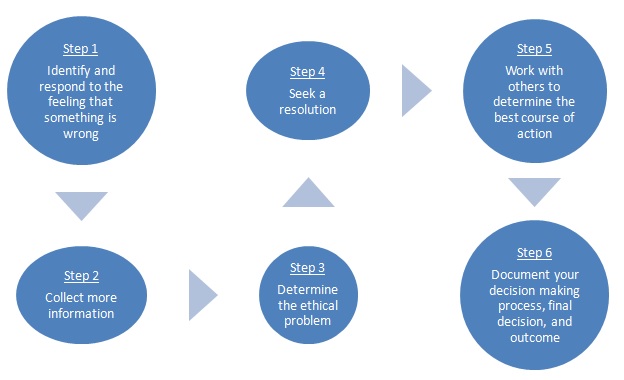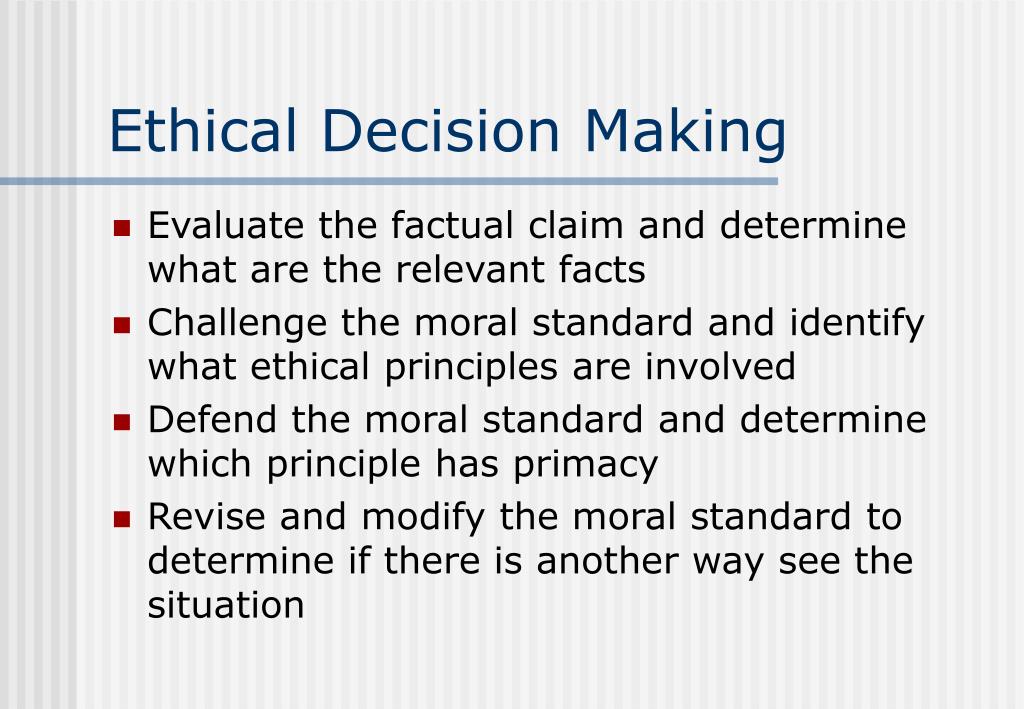
 The false necessity trap: "Necessity is an interpretation and not a fact." We tend to fall into the "false necessity trap" because we overestimate the cost of doing the right thing and underestimate the cost of failing to do so.
The false necessity trap: "Necessity is an interpretation and not a fact." We tend to fall into the "false necessity trap" because we overestimate the cost of doing the right thing and underestimate the cost of failing to do so.  If it's necessary, it's ethical: This approach often leads to ends-justify-the-means reasoning and treating non-ethical tasks or goals as moral imperatives. This means we have to understand the difference between immediate and short-term goals and longer-range goals.Ĭopyright 2002 Josephson Institute of Ethics Obstacles The key to making effective decisions is to think about choices in terms of their ability to accomplish our most important goals. A choice that produces unintended and undesirable results is ineffective. Effective decisions are effective if they accomplish what we want accomplished and if they advance our purposes. These behaviors provide a foundation for making better decisions by setting the ground rules for our behavior. Ethical decisions generate and sustain trust demonstrate respect, responsibility, fairness and caring and are consistent with good citizenship. Good decisions are both ethical and effective: Competency: The ability to collect and evaluate information, develop alternatives, and foresee potential consequences and risks. Consciousness: The awareness to act consistently and apply moral convictions to daily behavior. Commitment: The desire to do the right thing regardless of the cost. The process of making ethical decisions requires: In making ethical decisions, it is necessary to perceive and eliminate unethical options and select the best ethical alternative. When this is the case, the decision-maker should act in a way that will create the greatest amount of good and the least amount of harm to the greatest number of people.Ĭopyright 2000 Josephson Institute of EthicsĮthical decision-making refers to the process of evaluating and choosing among alternatives in a manner consistent with ethical principles. Some decisions will require you to prioritize and to choose between competing ethical values and principles when it is clearly necessary to do so because the only viable options require the sacrifice of one ethical value over another ethical value. It is ethically proper to violate an ethical principle only when it is clearly necessary to advance another true ethical principle, which, according to the decision-maker's conscience, will produce the greatest balance of good in the long run. If some rationalization begins to occur, this situation is probably present. This situation often occurs when people perceive a clash between what they want or "need" and ethical principles that might deny these desires. Perceiving the difference between ethical and nonethical values can be difficult. When faced with a clear choice between such values, the ethical person should always choose to follow ethical principles. Ethical values and principles always take precedence over nonethical ones.Įthical values are morally superior to nonethical ones. The underlying principle here is the Golden Rule - help when you can, avoid harm when you can.
If it's necessary, it's ethical: This approach often leads to ends-justify-the-means reasoning and treating non-ethical tasks or goals as moral imperatives. This means we have to understand the difference between immediate and short-term goals and longer-range goals.Ĭopyright 2002 Josephson Institute of Ethics Obstacles The key to making effective decisions is to think about choices in terms of their ability to accomplish our most important goals. A choice that produces unintended and undesirable results is ineffective. Effective decisions are effective if they accomplish what we want accomplished and if they advance our purposes. These behaviors provide a foundation for making better decisions by setting the ground rules for our behavior. Ethical decisions generate and sustain trust demonstrate respect, responsibility, fairness and caring and are consistent with good citizenship. Good decisions are both ethical and effective: Competency: The ability to collect and evaluate information, develop alternatives, and foresee potential consequences and risks. Consciousness: The awareness to act consistently and apply moral convictions to daily behavior. Commitment: The desire to do the right thing regardless of the cost. The process of making ethical decisions requires: In making ethical decisions, it is necessary to perceive and eliminate unethical options and select the best ethical alternative. When this is the case, the decision-maker should act in a way that will create the greatest amount of good and the least amount of harm to the greatest number of people.Ĭopyright 2000 Josephson Institute of EthicsĮthical decision-making refers to the process of evaluating and choosing among alternatives in a manner consistent with ethical principles. Some decisions will require you to prioritize and to choose between competing ethical values and principles when it is clearly necessary to do so because the only viable options require the sacrifice of one ethical value over another ethical value. It is ethically proper to violate an ethical principle only when it is clearly necessary to advance another true ethical principle, which, according to the decision-maker's conscience, will produce the greatest balance of good in the long run. If some rationalization begins to occur, this situation is probably present. This situation often occurs when people perceive a clash between what they want or "need" and ethical principles that might deny these desires. Perceiving the difference between ethical and nonethical values can be difficult. When faced with a clear choice between such values, the ethical person should always choose to follow ethical principles. Ethical values and principles always take precedence over nonethical ones.Įthical values are morally superior to nonethical ones. The underlying principle here is the Golden Rule - help when you can, avoid harm when you can. 
All decisions must take into account and reflect a concern for the interests and well being of all affected individuals ("stakeholders").The "Character-Based Decision-Making Model" model, developed by the Josephson Institute of Ethics, can be applied to many common problems and can also be used by most individuals facing ethical dilemmas. Seeks the common good for the most peopleĬopyright 2000 Josephson Institute of Ethics The Decision Making Model.Does not lay the blame on others needlesslyĪ person who is caring exhibits the following behaviors:Ī person who is a good citizen exhibits the following behaviors:.Understands that actions create certain consequencesĪ person who is fair exhibits the following behaviors:.

Treats others the way they want to be treatedĪ person who is responsible exhibits the following behaviors:.Deals peacefully with anger, disagreements, and/or insults.TrustworthinessĪ person who is trustworthy exhibits the following behaviors:Ī person who is respectful exhibits the following behaviors: Six key ethical values can help you build character in yourself and others.








 0 kommentar(er)
0 kommentar(er)
